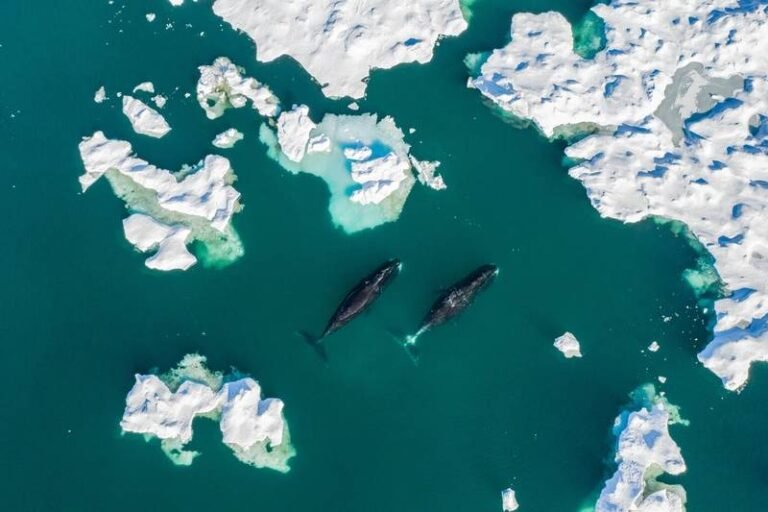The Arctic’s Bowhead Whales and the Growing Threat of Shipping Noise
The Arctic’s bowhead whales can live for over 200 years. Imagine what they might hear in that time: screw propellers were only just being used to power ships 200 years ago, and diesel engines appeared some hundred years after that.
The underwater radiated noise of shipping has grown globally, but the Arctic is a special place. It has been partially shielded from shipping noise. Sea ice shields and diffuses underwater sound, so belugas and narwhals, for example, can find shipping noise particularly disturbing – perhaps leaving the area for days. There have been reports of belugas fleeing in response to noise from an icebreaker over 30 kilometers away.
They are used to the sound of whale song and the cracking, popping, and groaning of ice.
Some Arctic whales use ice sounds for navigation or they can make sounds that are reflected off the ice for echolocation. “There are subtle differences in the acoustic environments of multi-year ice, young ice, and open water, as well as myriad combinations of these conditions,” according to Cornell University professor Christopher W. Clark. “All Arctic whales, even adult bowheads, can get trapped or die in ice, so there is clearly a selective advantage for specialized attributes that enable marine mammal to sense such threats. A naturally occurring ocean soundscape is essential for these mammals to take full advantage of their adaptations for listening to and producing sounds.”
The Arctic Council’s Protection of the Arctic Marine Environment Working Group (PAME) has been studying shipping noise in the Arctic for a couple of decades, a short time in a bowhead whale’s lifetime and not even that long in a beluga’s lifetime.
PAME found that noise levels in some places in the Arctic Ocean doubled between 2013 and 2019. Ship traffic continues to increase in volume, with some vessel types, including cruise ships, becoming larger as well.
The latest PAME research indicates that, with no further policy action, by 2030, underwater noise from shipping will increase significantly in the Arctic due to more ship traffic and reductions in sea ice extent and thickness. The modeling predicts that increases in noise levels will not be uniform and can range from a doubling to a ten-fold increase, even in areas with relatively low shipping currently, such as Baffin Bay and the Chukchi Sea.
Noise could be reduced by slowing ships down, but many already travel relatively slowly at around 10 knots. Ships could be redirected away from the blue corridors – the migration pathways of many whales – but shifting the noise may just shift the problem. Sanctuaries could be created, but they might need buffer zones to protect them from shipping noise.
Ships could be retrofitted with quieter propellers and follow a hull cleaning regime – measures laid out in the IMO’s voluntary guidance on underwater radiated noise. However, Dr. Melanie Lancaster, Senior Specialist, Arctic Species at WWF’s Global Arctic Programme, working with PAME, says the unique conditions in the Arctic call for special guidance.
“With the Arctic Ocean, we have an opportunity that we don’t have in the rest of the world’s oceans anymore,” said Lancaster. “This really is the last ocean that is relatively unpolluted by underwater noise. Instead of degrading nature and then trying to figure out how we can reverse that trend, we have an opportunity to actually put measures in place before more harm is done.”
The IMO has Observer status at the Arctic Council – which has just entered a two-year chairship by Denmark.

